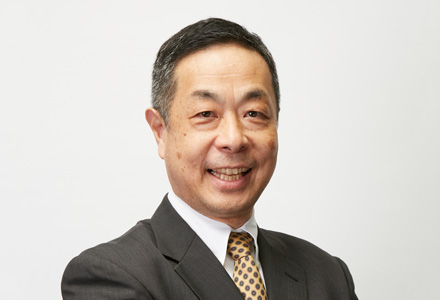The curriculum is focused on weekends, so you can attend school while working!

Graduated in March 2016 (5th batch)
Yasuyoshi Aoki
What made you decide to enroll in graduate school?
When I was taking the exam, I was impressed by the words "a grain of rice on the bottom of your foot" that came out of the mouth of a lecturer, and while I was preparing for the exam without being able to imagine myself working as a diagnostician after obtaining the qualification, I learned about the "Training Course/Registered Training Course" system. I thought that acquiring diagnostic know-how through exercises and practical training, and networking with seniors and peers would be a great engine for imagining the work of a diagnostician after graduation. Another big attraction was the possibility of learning more advanced specialized knowledge at graduate school.
Please tell us why you applied to our Small and Medium Enterprise Consultant Training Course.
The learning environment, including the curriculum, support, facilities, and schedule, was far superior to others. For example, (1) the lectures were practical, taught by lecturers who were active management consultants, (2) the opportunity to carry out management consultations on actual companies, (3) the support from the administrative office was substantial, (4) there was a shared research lab exclusively for the training course, and each student was provided with their own desk, and (5) each student was provided with their own locker and laptop. However, the biggest deciding factor was that the lectures were mostly held on weekends, meaning I could study without having to quit my job.
Did you have any difficulties while you were in school?
I was often told, "It must be tough because you're a businessman on weekdays and a graduate student on weekends, so you don't have time to rest," but I was able to switch my mind off and go to work on Monday feeling refreshed, so I didn't experience Blue Monday. However, when I was writing my master's thesis, it took me a while to switch my mind off work and remember the small details, so I ended up submitting it right at the last minute, which was unexpected.
What is the best thing about going to college?
I was inspired by group work and drinking parties with my peers from various industries and ages. Also, when I was presenting my management diagnosis during the diagnostic training, the wife of the company president held back tears and said "Thank you," and I was able to realize the significance of the activities of a small and medium-sized enterprise management consultant.
Please say a few words to those who are hoping to take the exam.
Although the course requires a 2-year study period and a 90% attendance rate, the curriculum is mainly on weekends, and students commuting from outside the Kanto region have also completed the course. In order to help new students overcome any anxieties they may have about attending school, the Mizuho-kai Small and Medium Enterprise Management Consultant Study Group holds a welcome party in March before the students begin school, where they can socialize with current students, graduates, and instructors. Graduates who are now Director of the Consultant Associations of Chiba and Kanagawa prefectures also attend, and the welcome party is useful for forming an image of what it will be like to work as a consultant, not only during their studies but also after graduation.